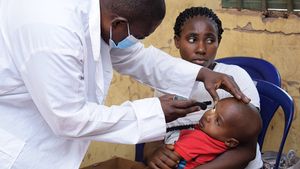Treatment GuideJust DiagnosedSex & DatingAfrican AmericanStigmaAsk the HIV DocPrEP En EspañolNewsVoicesPrint IssueVideoOut 100
CONTACTCAREER OPPORTUNITIESADVERTISE WITH USPRIVACY POLICYPRIVACY PREFERENCESTERMS OF USELEGAL NOTICE
© 2025 Pride Publishing Inc.
All Rights reserved
All Rights reserved
Scroll To Top
By continuing to use our site, you agree to our Private Policy and Terms of Use.
Since the beginning of the epidemic, gay men seeking unprotected intercourse have developed their own methods of attempting to prevent the spread of HIV -- namely, selecting only partners with the same HIV serostatus as themselves. On its face, the practice -- which the public-health sector has dubbed 'serosorting' -- sounds like a no-brainer as a safety precaution. And researchers who've delved into the issue have found that the practice provides potential benefits, along with some risks, for HIV-positive men. But for HIV-negative men, it's a whole different -- and dangerous -- ball game. 'It's this paradoxical scenario where people believe they're safe but are taking risks at the same time,' says Lisa A. Eaton, a postdoctoral fellow at the Yale School of Public Health and lead author of the study, whose results were published in the October issue of the journal AIDS Care. Her study found that between 21% and 62% of both HIV-negative and -positive men report serosorting. HIV-negative men are often falsely reassured by the assumption that their partners are also free of the virus -- with many relying only on nonverbal cues to confirm another's HIV status. For those who do ask about HIV, the study points out that it may be impossible for men to test for HIV frequently enough to accurately know their own serostatus. Furthermore, untreated sexually transmitted diseases can help fuel the spread of HIV among serosorting sexual networks. So for these men, Eaton points out, their approach to the practice of serosorting is actually increasing their risk for infection. Then there are some HIV-positive guys who, however, simply assume their partner is the same serostatus as themselves without actually having a conversation about HIV. As many as a third of seropositive gay men report having unprotected intercourse without ever disclosing their HIV status. And some say the false sense of security that serosorting is creating is really doing more harm than good. Mark S. King, a blogger at TheBody.com, says that for HIV-negative men, 'Serosorting is just a different name for the ignorance and lying we've been doing all along. Why call it 'serosorting'? Call it '1985.' ' And though King doesn't think the practice is OK for people who are HIV-negative, the 49-year-old has seen value in it for himself and other HIVers. He says he got tired of the anxiety about potentially infecting his partners and began exclusively seeking out other HIV-positive men. Among other reasons that many gay HIVers are motivated to serosort, Eaton's study finds, is the fear that disclosing will lead to stigma or personal rejection. They may also worry about state laws that criminalize HIV exposure. Longtime AIDS activist and AIDSMeds.com founder Peter Staley agrees with King's approach: 'I think serosorting for HIV-positive men, in my book, is a good thing. I actually consider it one of the perks of being HIV-positive -- that we have far fewer issues to deal with from unprotected sex between each other than HIV-negative men do.' 'It's ironic,' King points out, though. 'Jesse Helms wanted to put us on an island and otherwise segregate us. And now that's exactly what we're doing for ourselves. Just because it does lower that anxiety.' But concerns aren't just about transmitting HIV. Unprotected sex outside of a mutually monogamous relationship in which both partners have been screened for STDs, experts point out, is always a risk. STDs can lower T-cell counts, raise viral loads, and generally put a body with a weakened immune system in a tailspin. Terry Smith, associate director of education at AIDS Project Los Angeles recommends that HIV-positive men with multiple partners get screened every three months for a range of STDs. And as for the much-debated potential for superinfection, Eaton's review states that this is a proven risk. However, it is rare and tends to happen only in people who are newly infected.
From our Sponsors
Most Popular
Lexi Love comes out as HIV+ after Trump deletes federal resources
January 23 2025 11:23 AM
Ricky Martin delivers showstopping performance for 2024 World AIDS Day
December 05 2024 12:08 PM
Trump's orders prompt CDC to erase HIV resources
January 31 2025 5:29 PM
Meet our Health Hero of the Year, Armonté Butler
October 21 2024 12:53 PM
California confirms first case of even more deadly mpox strain
November 18 2024 3:02 PM
This long-term HIV survivor says testosterone therapy helped save his life.
December 16 2024 8:00 PM
Plus: Featured Video
Latest Stories
Broadway's best raise over $1 million for LGBTQ+ and HIV causes
April 03 2025 7:15 PM
Jess King is here to help you live your happiest, healthiest life yet
March 24 2025 4:35 PM
Celebrating Black History Month with our annual African American issue
February 01 2025 3:28 PM
Plus nominated for 2025 GLAAD Media Award
January 22 2025 12:42 PM
Hollywood must do better on HIV representation
December 01 2024 9:00 AM
Check out our 2024 year-end issue!
October 28 2024 2:08 PM
Twice-yearly injectable lenacapavir, an HIV-prevention drug, reduces risk by 96%
October 15 2024 5:03 PM
The Talk Season 5 premieres this spring with HIV guidance for the newly diagnosed
March 26 2025 1:00 PM
Discover the power of Wellness in your life
March 26 2025 12:41 PM
BREAKING NEWS: Trump admin moves to end federal HIV prevention programs
March 18 2025 6:10 PM
Tyler TerMeer vows to continue to fight for health care for all
January 28 2025 3:00 PM
A camp for HIV-positive kids is for sale. Here's why its founder is celebrating
January 02 2025 12:21 PM
AIDS Memorial Quilt displayed at White House for the first time
December 02 2024 1:21 PM
Climate change is disrupting access to HIV treatment
November 25 2024 11:05 AM
Season 4 of The Switch on resilience & radical self-love returns this spring
March 26 2025 12:20 PM
Gerald Garth is keeping people of color happy and healthy through trying times
March 11 2025 3:38 PM
'RuPaul's Drag Race' star Trinity K Bonet quietly comes out trans
December 15 2024 6:27 PM
Decades of progress, uniting to fight HIV/AIDS
December 01 2024 12:30 PM
Post-election blues? Some advice from mental health experts
November 08 2024 12:36 PM
AIDS/LifeCycle is ending after more than 30 years
October 17 2024 12:40 PM













































































